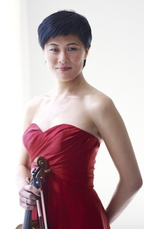The Portland Symphony Orchestra’s concert Tuesday night at Merrill Auditorium was a study in contrasts. The first half contrasted the menacing “Doctor Atomic” Symphony of John Adams with Aaron Copland’s “The Tender Land” Suite – two wildly different pieces of Americana – while the second half was devoted to the quintessence of late Romanticism, the Tchaikovsky Concerto in D Major for Violin and Orchestra, Op. 36, with Jennifer Koh as soloist.
“Dr. Atomic” sounds like a comic book, but Adams’ symphony, based on his opera about the final development of the atomic bomb, is deadly serious, using every resource of the orchestra to create an atmosphere of doom.
Even its quiet moments are alarming, as if the beast in the cellar is being held by the weakest of chains.
Its problem is that it goes on far too long without relief, so that the “boom” at the end comes as an anticlimax. The orchestra, under music director Robert Moody, played it brilliantly, perhaps inspired by Fukashima.
The “Doctor Atomic” Symphony was contrasted with Copland’s portrayal of nature and humanity in a friendlier mood, but “The Tender Land,” a written-for-TV opera, is not “Appalachian Spring.”
It is almost as if Copland was intimidated by the (then) new medium, and reluctant to give his musical ideas their usual free rein. The network turned it down anyway.
I had heard Koh live at the Salt Bay Chamberfest, interpreting contemporary music, and found her to be not only a superb technician but also a sensitive champion of difficult “modern” music.
Her technical abilities were evident in the Tchaikovsky, as was her passion for the music, but she lacks the heroism gene required to make the concerto a truly memorable experience. After all, there are not many soloists willing to take on the full volume of a symphony orchestra and emerge victorious.
Tchaikovsky doesn’t make the job easier, with orchestration that tends to drown out all but the most dominant of violinists. In some instances, Moody was not entirely helpful. Tutti sections, without the violin, tended to be so loud as to mute the next entrance of the soloist.
Koh was at her best in carefully thought-out cadenzas, with some unusual fermatas (pauses) that made it seem as if she were looking for the perfect phrase. Her interplay with soloists in imitative passages was also striking.
The savage final movement, marked “allegro vivacissimo,” was taken at breakneck speed. Koh and the orchestra managed it very well, making it exciting without sacrificing too much detail. It received a standing ovation.
Christopher Hyde’s Classical Beat column appears in the Maine Sunday Telegram. He can be reached at classbeat@netscape.net.
Send questions/comments to the editors.



Success. Please wait for the page to reload. If the page does not reload within 5 seconds, please refresh the page.
Enter your email and password to access comments.
Hi, to comment on stories you must . This profile is in addition to your subscription and website login.
Already have a commenting profile? .
Invalid username/password.
Please check your email to confirm and complete your registration.
Only subscribers are eligible to post comments. Please subscribe or login first for digital access. Here’s why.
Use the form below to reset your password. When you've submitted your account email, we will send an email with a reset code.